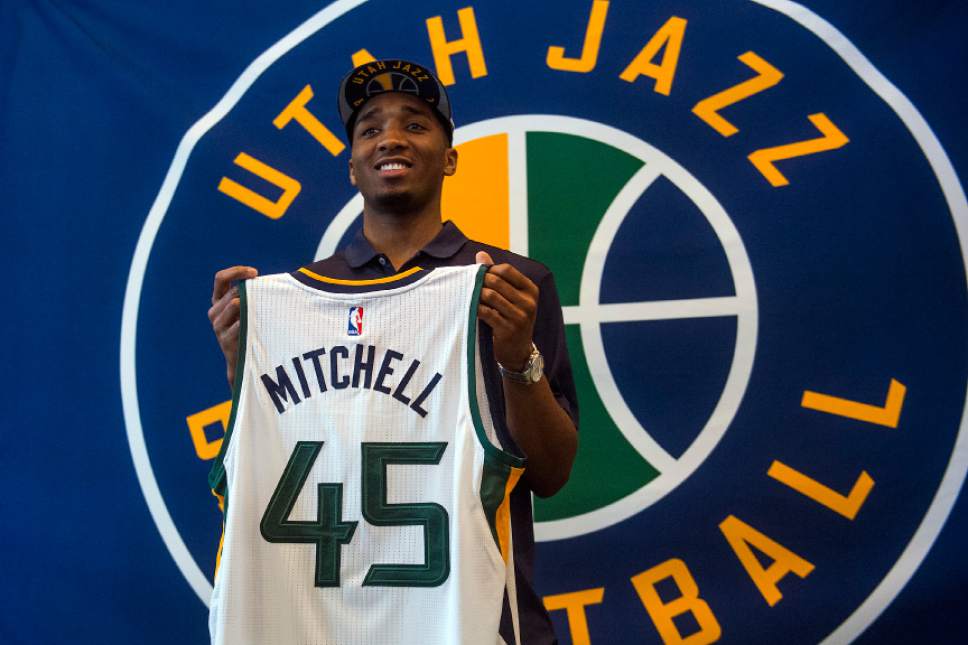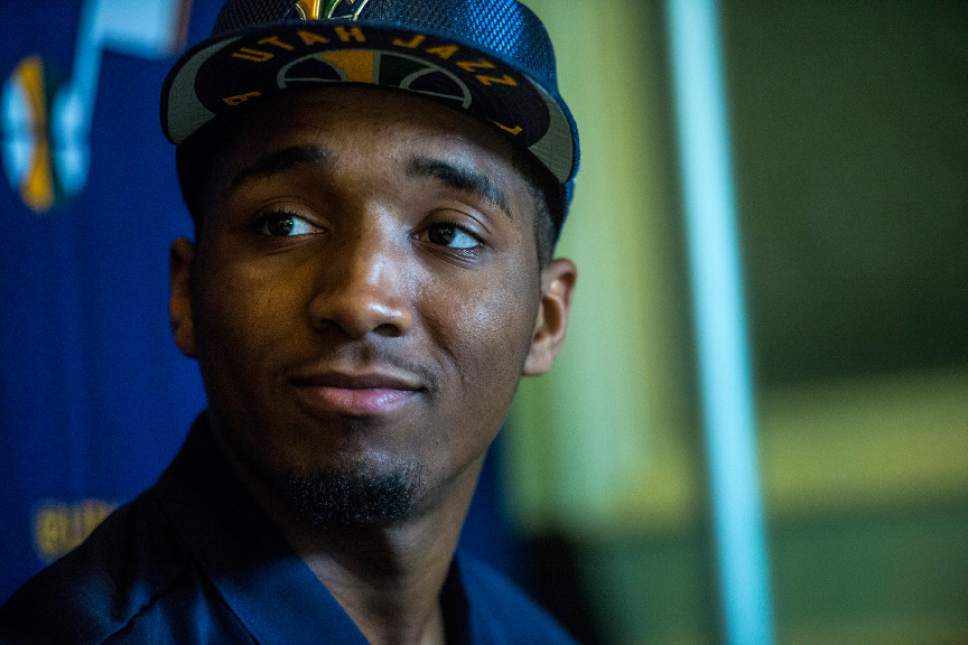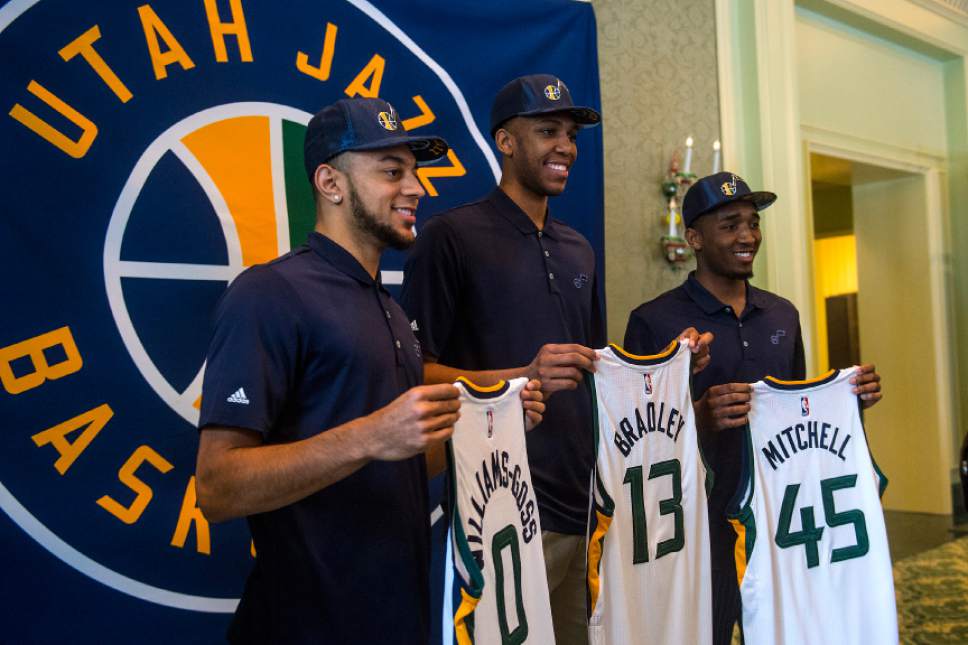This is an archived article that was published on sltrib.com in 2017, and information in the article may be outdated. It is provided only for personal research purposes and may not be reprinted.
The crowd of college coaches huddled inside the gym of the New England boarding school. They were bleary-eyed from recruiting, but soon perked up as a slim, long-armed guard began his warmup with dunk after dunk after dunk.
"There were 10 to 12 coaches on the baseline asking, 'Who the hell was that?'" said Jason Smith, head coach of the Brewster Academy in New Hampshire.
Donovan Mitchell has a way of introducing himself like that. It was those warmup dunks, and others, that put him on the radar.
There was the one at the Under Armour Elite 24 in 2014, when Mitchell used every bit of his 6-foot-10 wingspan to reach back and grab a three-quarter court pass with his right hand and flush it, bowling over a Brooklyn crowd. There was the one where he recorded himself doing a 3-point shot from the left side of the court, then leaping for the rebound and dunking the ball before it could hit the ground that went viral, looped over and over online and on TV. And then slam after slam at Louisville that helped turn him into a lottery pick.
"I fell in love with the attention from dunking," Mitchell said. "I'm not going to lie to you. It was a lot of fun."
But beyond his SportsCenter-quality, the 20-year-old has a way of commanding attention — on the court, on the stage, among his peers. He stands out not just because he's a freakish athlete the Utah Jazz drafted to be an elite defender, but because of a personality that shines through in both press rooms and locker rooms.
"Being the star means all eyes are on you," he said
This fall, when he steps in front of 19,000 at the Vivint Arena, he's looking forward to making another introduction.
l l l
On long, traffic-riddled rides between his home in Westchester, N.Y., and his games at the southern tip of Manhattan, he would find himself explaining basketball to his mother — why certain things happened in games, or why certain rules were in place. They talked for hours as Donovan's sister, Jordan, slept in the back.
Nicole Mitchell sneaked her own lessons in as well.
"Donovan always thanked his sister after every practice [for being there]," she said. "I kind of encouraged that. I wanted them to both mutually respect each other. After that, I didn't have to do that. He did it on his own."
Donovan Mitchell picked things up quickly, especially when it came to sports, and he took to basketball and soccer. But his true love as a child was reserved for baseball — his father, Donovan Sr., played minor league ball in the Houston Astros system, and went on to work for the New York Mets.
Ever since he was about 3, Mitchell seemed to always have a baseball in his hands. Weekends were eventually filled with baseball tournaments in the morning and basketball games at night.
He was a good pitcher, his fastball topping out at 86 miles per hour. But his mother suspected he was better on the court. By the time he reached middle school, she saw the separation in talent between her son and the other boys. She heard the frustration in the coaches' voices any time Donovan had a baseball game that kept him out of a basketball game.
"I never wanted to make that choice for him," she said. "He needed to come to that conclusion on his own."
While Mitchell started trending toward basketball in high school, the choice was virtually made for him. In a game he was pitching as a sophomore, a batter popped a fly ball that Mitchell chased, colliding with his own catcher. Mitchell broke his wrist. The catcher broke his jaw.
The injury gave Mitchell time to consider his athletic future. He missed both baseball and basketball as he sat out the summer before his junior year, but he missed basketball more.
He had some catching up to do after missing that summer, which is typically a time for high school prospects to get on college radars. Mitchell transferred to Brewster Academy, where he was a nearly anonymous figure on a stacked squad.
It didn't stay that way. When a returning player said in one of the first practices it "wasn't a typical Brewster team" — implying that Mitchell and another newcomer, Devonte Graham, didn't have the reputation of the school's typical caliber recruit — Mitchell let his play do the talking.
"That week, Donovan and Devonte probably won 90 percent of the games in our scrimmages," Smith said. "[When they won], Donovan and Devonte would pipe up and say, 'We're not a typical Brewster team, huh?'"
l l l
Mitchell wouldn't stay a secret for long: He helped lead one of Brewster's most successful two-year runs, both of which culminated in New England championships and national prep championships. In those two seasons, the Bobcats won 67 games.
But Mitchell didn't just thrive on the court as a high schooler. He was a drummer in school bands, and he sang in chorus in church and school, performing a solo in "Oliver!"; after his first year at Brewster, he was elected senior prefect, the equivalent of class president.
Smith, the Brewster coach who also works in the admissions office, used Mitchell to attract big recruits — he would give as many as five campus tours in a day.
"I just pride myself on being a well-rounded person," Mitchell said. "I don't like the label of athlete."
He had ways of ceding the spotlight to show his leadership as well. During one tournament for his club team The City, Mitchell had to come off the bench for missing practice. His coach Arjay Perovic told him if the team made a run, Mitchell would start again.
After The City won its first few games, Mitchell was poised to start. But before the game that morning, Mitchell met privately with Perovic about concerns that the player who was starting over him wouldn't respond well to being replaced. Mitchell thought it would be better for the team if he kept coming off the bench.
"I was so emotional when he said that," Perovic said. "Here I have a 15-year-old young man putting his ego after the team, this classic way of leading by example. He was so mature to understand that."
With Mitchell coming off the bench, The City won the tournament.
l l l
Upon arriving at Louisville, Mitchell quickly made a friend: former Jazzman Darrell Griffith.
The man known as Dr. Dunkenstein is a strong presence around town, showing up to Louisville games and working as a special assistant to the president of the university. But as much basketball insight as Mitchell hoped for out of Griffith, there was another kind of appeal: dining at his restaurant, Griff's.
"The chicken and waffles are delicious," Mitchell said. "Coach [Rick Pitino] wouldn't like me saying that."
But Mitchell also made an impression on Griffith: The first time he saw Mitchell at a practice, Pitino leaned over to tell him, "This kid is special."
Griffith didn't need to be told.
"His leaping ability is crazy," Griffith said. "He'll just come out of nowhere and just fly over you. He's a special talent."
That's not to say Mitchell's career was an easy one at Louisville. As a freshman, he played behind two graduate transfers, finding contentment in his rare flashes for highlights. Louisville also missed the postseason due to a self-imposed NCAA tournament ban stemming from a recruiting scandal at the school in which Mitchell played no part. It helped cultivate patience, if nothing else.
Ahead of his sophomore year, Mitchell drummed up hype with workouts, but the start went slower than hoped. He scored in single digits in five of his first nine games, and shot 40 percent or lower in six of those games. In a tournament in the Bahamas, Louisville had a 25-point lead on Baylor, which Jazz general manager Dennis Lindsey was in town to see (his son Jake plays for the Bears), and the Cardinals lost. Though Mitchell scored 17 points, Pitino was frustrated with his defense in the Baylor comeback.
"Coach P just let us have it in practice after that loss," Mitchell said. "That's the one film session I definitely don't forget."
Pitino challenged him, telling him he needed a star. Jordan Mitchell saw that her brother needed a family member to tell him how it was. In one of her ritual pregame texts, she sent him some tough love.
"I thought it was time for him to pick it up and be himself," she said. "The game before wasn't my brother that I knew. I think I had to say some encouraging words to get him going."
That text came before a December game against Indiana — a game in which Donovan scored 25 points.
He would go on to lead the team in scoring (15.6 ppg.) and steals (70) as the Cardinals finished 25-9. He was an All-ACC defensive team honoree. He credits Pitino in a large part for shifting his mentality to be a college star.
"He developed me into being a hungry player," Mitchell said. "I was always hungry, but even hungrier and meaner — that perfectionist that I always talked about."
l l l
Mitchell has qualities he never realized he'd be put in the spotlight for. He discovered one at the NBA Combine: his 6-foot-10 wingspan.
But while it had always been difficult for him to find shirts that fit him, steals and jaw-dropping dunks had always come easily. Suddenly, the first-round hopeful was being talked about as a lottery pick.
"I don't think about it," he said. "It wasn't like I said to myself, 'oh, I've got a 6-10 wingspan,' I just play defense."
The turning point for Mitchell, who at one time said he wanted to return to Louisville, came when he worked out in California with a handful of NBA players, including Chris Paul. The insight he gained helped convince him he was NBA-caliber.
His first NBA pre-draft workout was with the Jazz, who told him they thought he would be taken ahead of their No. 24 pick, but wanted to keep options open. Mitchell, who didn't want to shun any team, was happy to oblige.
His visit to Utah was eye-opening. Ever since he first stopped in Salt Lake City, Mitchell has been effusive about the state, and it hasn't just been in front of a camera.
"This was the only workout where Donovan texted me and said, 'Momma, this place is amazing,'" Nicole Mitchell said. "He showed me a picture from the airplane, like this snowcapped mountain. He was just overjoyed."
That joy peaked on draft night, when Mitchell stepped off the stage in Brooklyn after being selected with the No. 13 pick to realize the Jazz had traded for him. One of the first people to call him was Griffith, who had been texting with a Jazz employee and asked him to hand the phone to Mitchell.
"I just told him congratulations, and especially for being selected by the Utah Jazz," Griffith said. "I told him it was a great organization and he'll enjoy it. They're all about winning."
Mitchell's reply: "I'm so happy I could cry."
Back in New York and Connecticut, a score of people are preparing to buy Jazz jerseys sporting Mitchell's No. 45. Perovic, a longtime cynical New York Knicks fan, said he's switching to Utah. Once fans get an eyeful of Mitchell, he said, he thinks there will be others behind him in line.
"He was just exposed to so much at a young age where doing more is the norm," he said. "He just wants more. He wants to help people. He's a big thinker. He's not OK with being average."
Mitchell has already tried to make inroads in Utah with passionate, smile-filled interviews. He's texted and talked with his teammates by phone. When the Jazz traded for Ricky Rubio on Friday, he sent Rubio a welcoming tweet in Spanish.
As for his future stardom, Mitchell doesn't like to speculate. He said he'll try to earn playing time as a defender and develop his game from there — it's a humility that has sat well with many in the Jazz organization from Lindsey on down. While others who know him want to sing his praises, want to say how much he commands attention and respect, Mitchell will simply try to introduce himself the way he always has.
"I just let the work speak for itself."
Twitter: @kylegoon and @aaronfalk —
How high can you go?
How Donovan Mitchell's standing vertical leap (SVL) stacks up with some past Dunk Contest champs:
NAME COMBINE SVL
Donovan Mitchell 2017 36.5
Glenn Robinson III 2014 36.5
Zach LaVine 2014 33.5
Terrence Ross 2012 31
John Wall 2010 30
Blake Griffin 2009 32
Nate Robinson 2004 35.5
Source: NBA.com/Stats







